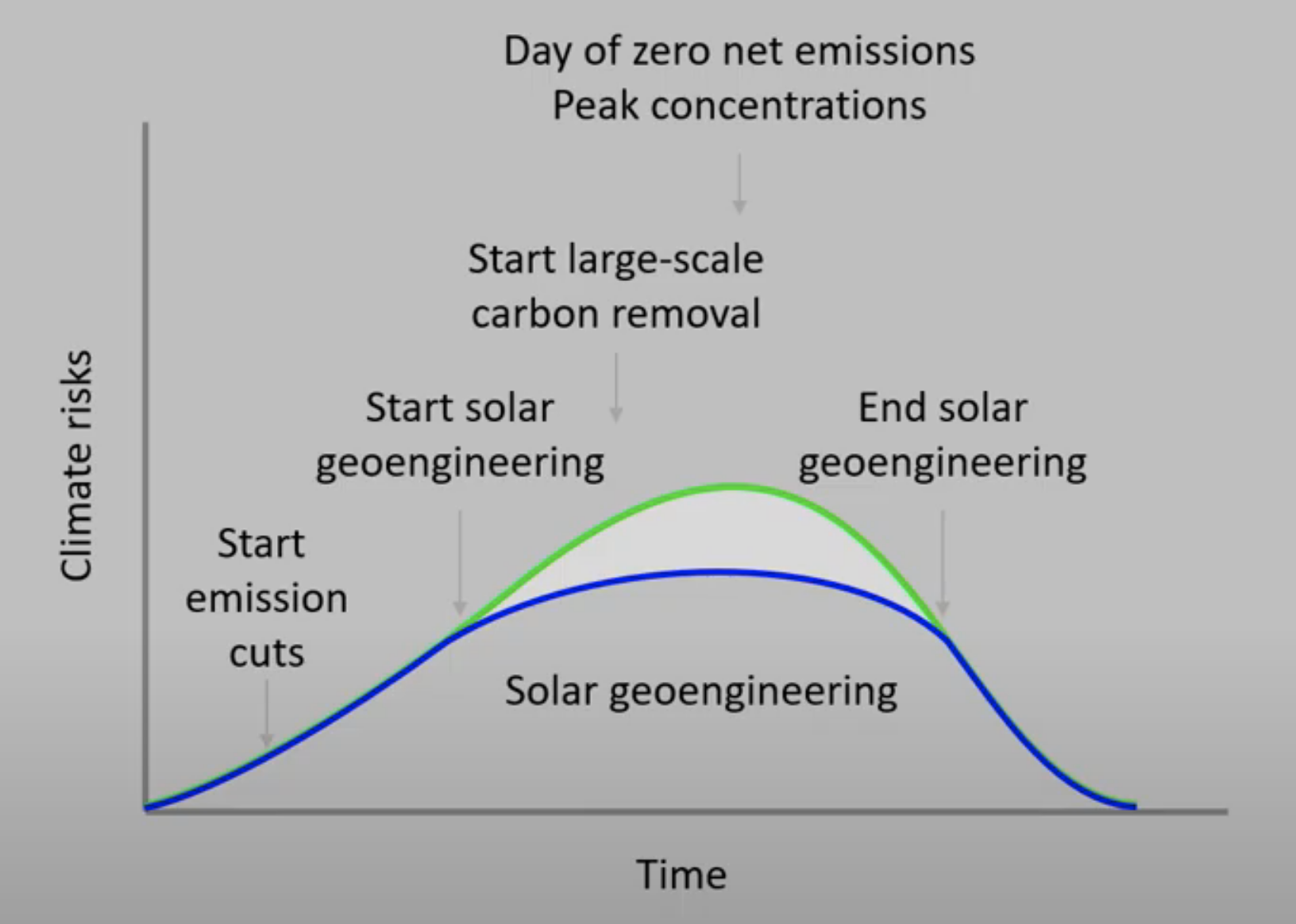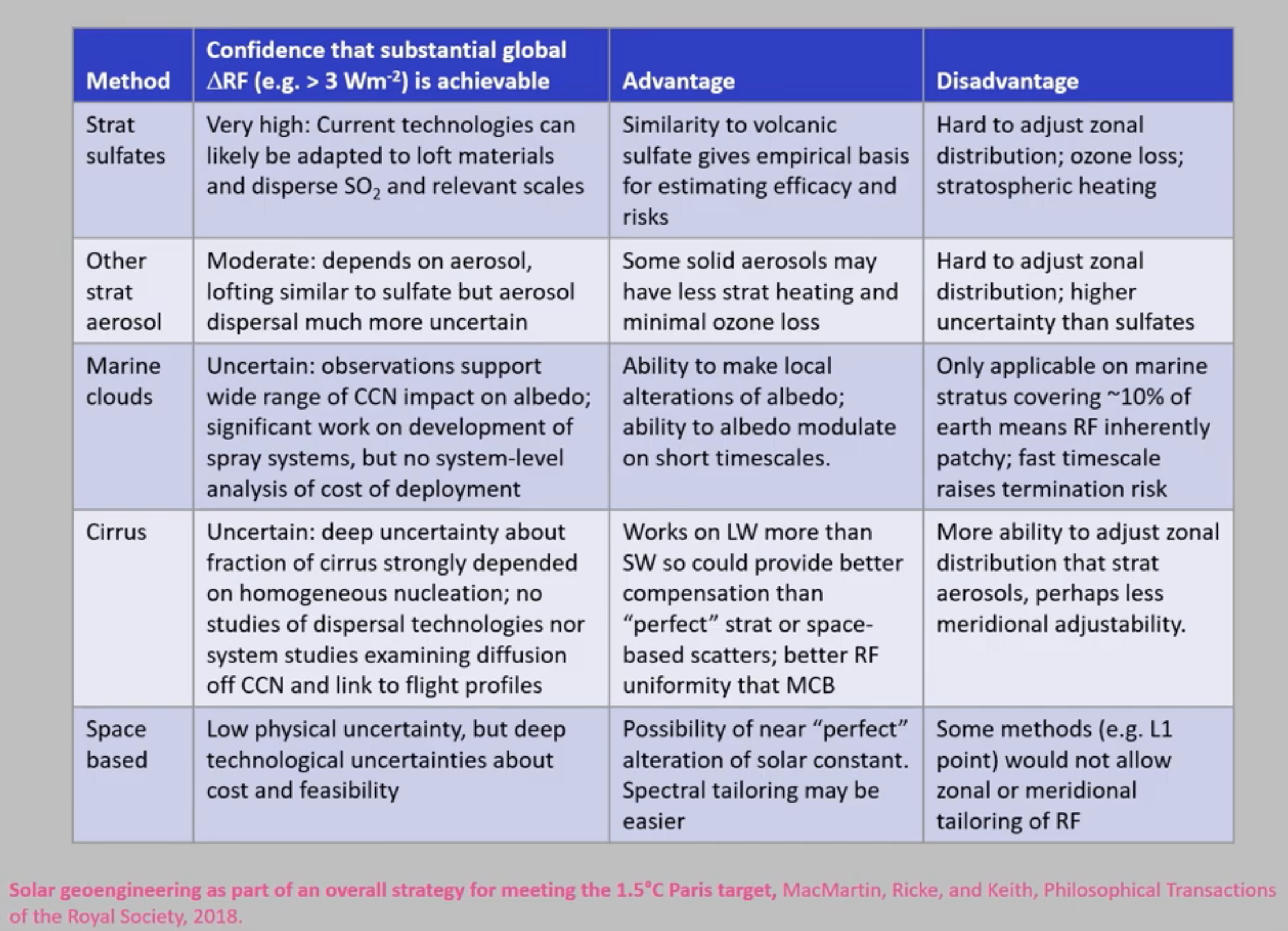The Perils and Potentials of Geoengineering
- 7 minsThe recent fires in California have hit too close to home. The crisis we see now with coronavirus and the nation’s response to it, although terrible, pales with the millions who will be displaced and whose lives will be affected by climate change. Not to mention, the causes of climate change (deforestation, unsustainable farming practices, air travel, etc.) will increase the risk of future pandemics. We must do something.
Last fall, I went to a great talk given by David Keith on geoengineering, or the deliberate large-scale intervention in the Earth’s natural systems to counteract climate change. Earlier that summer, I read an article from the MIT Technology Review on the potential benefits and drawbacks of geoengineering, which re-sparked my interest in the field. 1
“In my view, solar geoengineering is—at best—a supplement to emissions cuts, not a substitute for them. It is possible that a combination of emissions cuts, carbon removal and solar geoengineering could provide a significantly safer climate than emissions cuts alone or emissions cuts and carbon removal combined. Possible, but unproven.” — David Keith
We should care about geoengineering because it is not enough to be carbon neutral. Even if we bring our emission rates down to zero by 2050, we have done irreversible damage to the environment. Scientists believe that stabilizing at 450 parts per million volume of carbon dioxide would give us a 50 percent chance of limiting increases in global mean temperature below 2 degrees Celsius. Reducing pollution, promoting green energy, eliminating fossil fuels, etc. is paramount—but it may not be enough. Geoengineering is not a panacea; it must be used in conjunction with environmental practices. But it may be necessary to quell the rising temperatures.
 A graph that looks familiar in the pandemic times: flattening the curve. Essentially, geoengineering can help curb the worst effects of climate change, especially during the peak emission points.
A graph that looks familiar in the pandemic times: flattening the curve. Essentially, geoengineering can help curb the worst effects of climate change, especially during the peak emission points.
While modifying Earth’s climate is nothing new—humans have been running controlled fires and engineering their environment for centuries, large-scale and purposeful engineered methods to change the weather is different. There are many proposed methods of geoengineering that all involve cooling the planet in some way. These methods are generally split into two camps: one called carbon geoengineering, or carbon dioxide removal (CDR). This would address the root cause of climate change. The second is solar geoengineering, or solar radiation management (SRM), which aims to reflect a small fraction of sunlight back into space or increase the amount of solar radiation that escapes back into space. Unlike carbon geoengineering, solar geoengineering doesn’t address the root cause of climate change and instead aims to cool the planet despite large CO2 levels.
 Advantages and disadvantages of various solar geoengineering strategies.
Advantages and disadvantages of various solar geoengineering strategies.
From what I’ve learned, chemical aerosols, although inexpensive, may have unintended and adverse consequences, and we should use chemical solar geoengineering as a last resort. Light coverings, like satellites in low-earth orbit, may be a relatively non-intrusive way to cool our planet. However, the costs of this feat are massive, and it would take decades of global effort—but the costs of not developing it may be even more massive. Furthermore, the politics of geoengineering can get extremely messy–some countries are already reluctant to go carbon neutral, let alone carbon negative or earth cooling. Another huge problem with solar geoengineering is that the effects are uneven across the globe.
There is still much research to be done in geoengineering. Yes, it is terrifying. But it may also be terrifying not to even consider it. Research in geoengineering needs to be done because it is too important to be ignored like it is in government 2. Public opinion is important; even the videos on geoengineering on Youtube have an unusually low like to dislike ratio. Not that this means a lot, but some of the comments are pretty cruel and fearful—and I don’t blame them. People are mostly worried about “playing God”—but isn’t that what we’ve long been doing, most significantly since the Industrial Revolution? While I am extremely hesitant towards touting the benefits of geoengineering, I agree with Keith that not even investing in this area of research in is hubris. If (or most likely, when) we need it, we will need to have dedicated years of research, small-scale testing, and public education in this field.
We need more people to speak up and demand change from the status quo. But we need not just awareness of climate change; even if some people don’t believe in climate change, there’s not much we can do to change their minds. The facts are there, whether they want to believe in it or not (and if they don’t believe it, future generations will be forced to). Instead, we need actionable steps, resources (expertise and funding), and leadership. We need people (especially policy-makers) to learn science, tech, and math with an emphasis on solving problems that matter, in however that is defined on a personal and societal level. We need better structures of governance, education, resource allocations, and policies. Most of all, we need innovation. The solutions to our current problems can’t be completely solved with our current technology—nuclear energy still produces waste we don’t properly deal with, and our society is still heavily dependent on fossil fuels. All in all, many of us are blessed with a choice on how to live our lives—to dedicate it to something that matters. I just hope that people (myself included) choose wisely—not just for ourselves and future generations, but for life itself.
-
On the plane ride home to CA during freshman year, I watched a rather silly science fiction movie, “Geostorm”, that got me thinking about how we can use low-orbit satellites to alter Earth’s climate, and the technical and moral dilemmas that come with that. I then had a really great discussion with someone who studied the effects of the arctic sea level rise on climate change. The conversation was so amazing–we talked about everything from geoengineering to space exploration, climate change policy, and Icelandic horses. I remember she was surprised when I said I was majoring in CS (at the time, I wasn’t majoring in physics)—I seemed so passionate about Aero/Astro and climate change (not that CS isn’t used in these areas—in fact, I think CS knowledge is a great foundation for these interests—but just that I wasn’t studying environmental engineering or space in some form). And in some ways, I sort of veered from my initial passions during college, but I have learned so much that has strengthened my love for the subjects and ultimately brought me full circle. ↩
-
As an aside—out of all of the candidates in this election cycle, only a few (Andrew Yang and Bernie Sanders) even mentioned geoengineering. While Bernie Sanders dismissed geoengineering as a “false solution”, Andrew Yang called for research into the topic (and also supported nuclear energy). What frustrates me is that a lot of media presents Yang’s policies and solutions as “unconventional” and “unique”–when in actuality, he’s one of the few candidates who looks hard at the science and data and considers nuanced answers even when they are unpopular. Even looking at what’s happening with the pandemic, which has sped up a lot of the inevitable, many of his predictions have come true. The necessity for universal basic income cannot be understated, and it’s interesting that people on both sides of the aisle now think it’s a good idea–when just a year ago, it was swept under the rug. In any case, the disastrous policies set in place and dismantled by the current US administration (like rolling back provisions to curb greenhouse-gas emissions and pulling out of the Paris Agreement) is a call to action to our leaders. I sincerely hope that US can lead climate action, but if not, China and other countries must lead the way. ↩